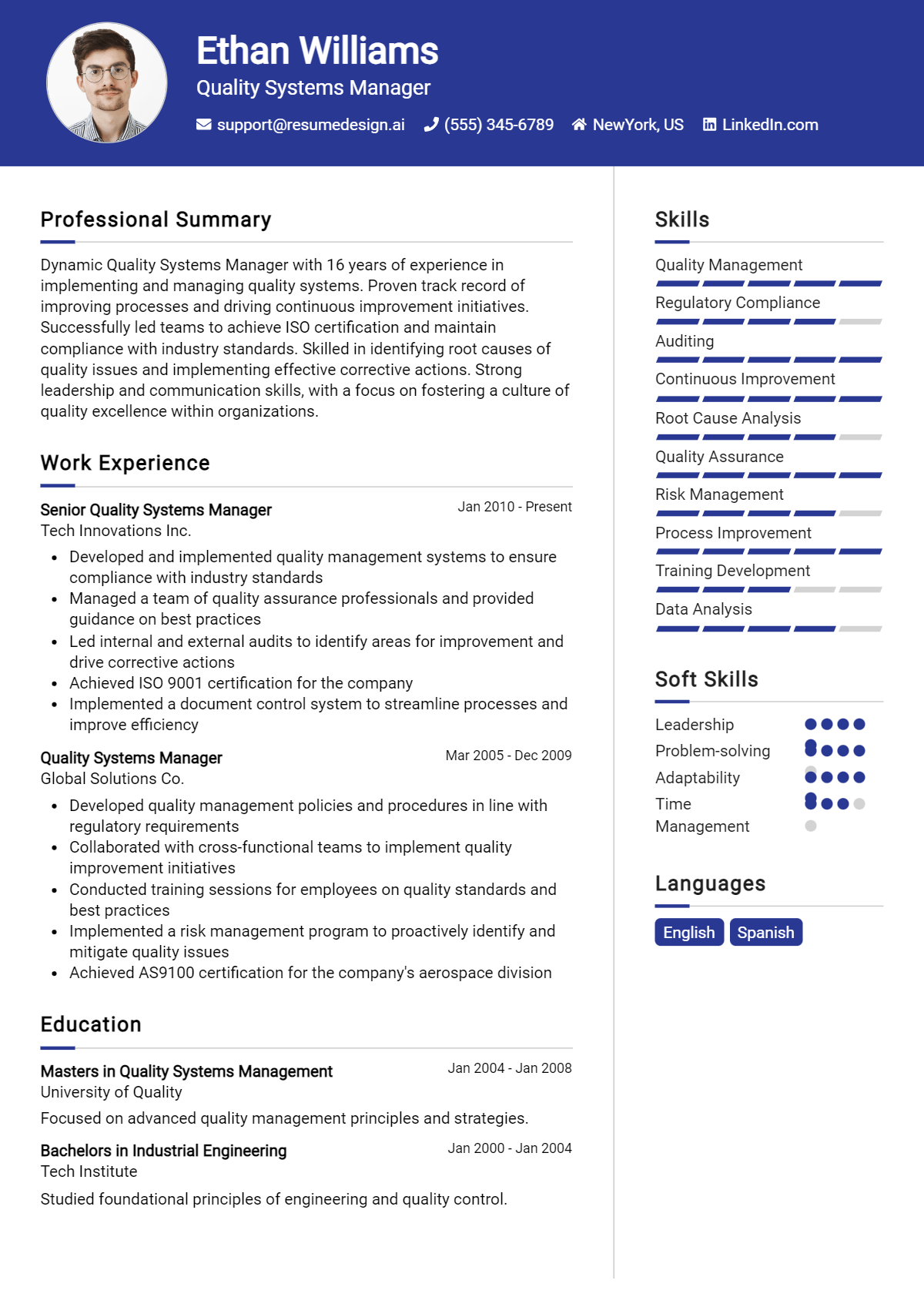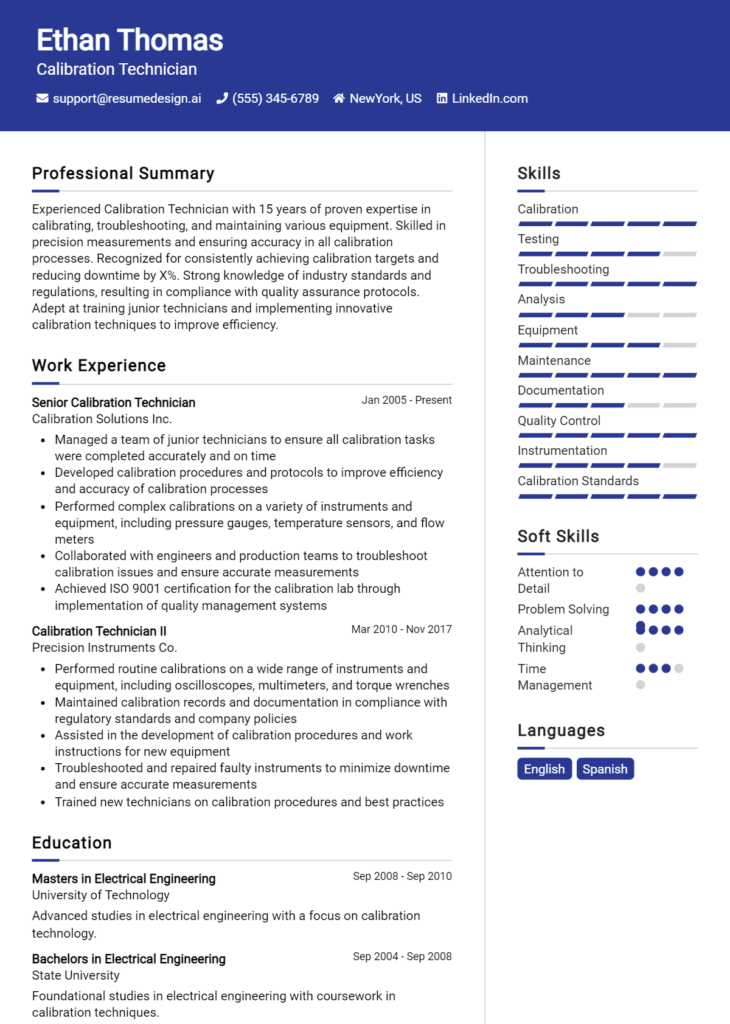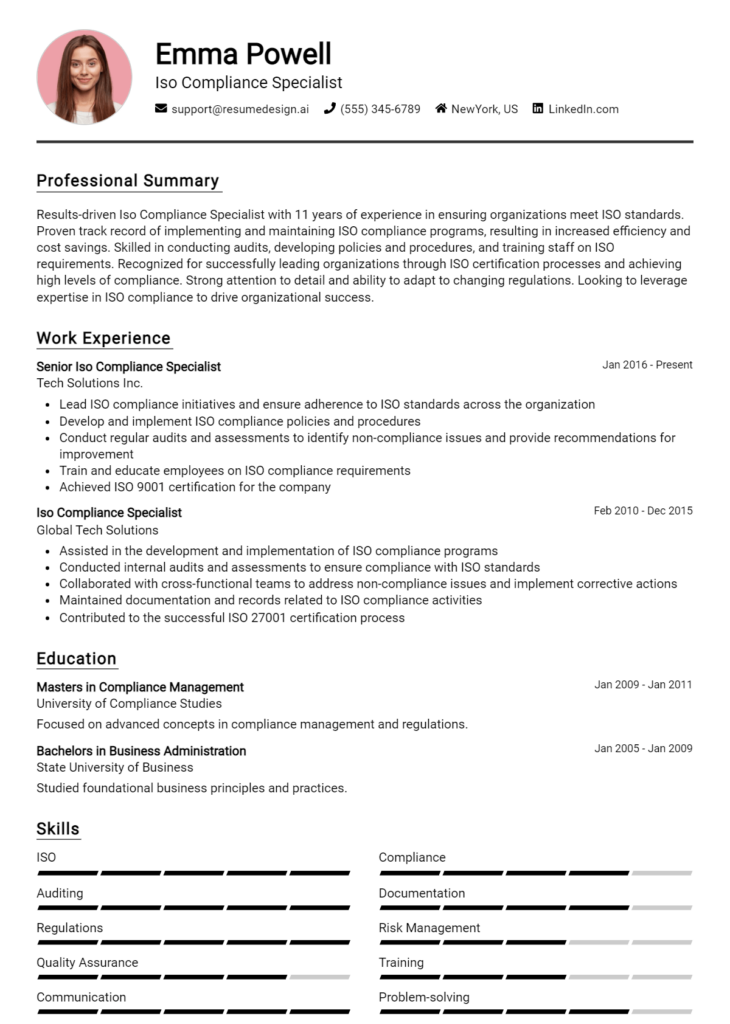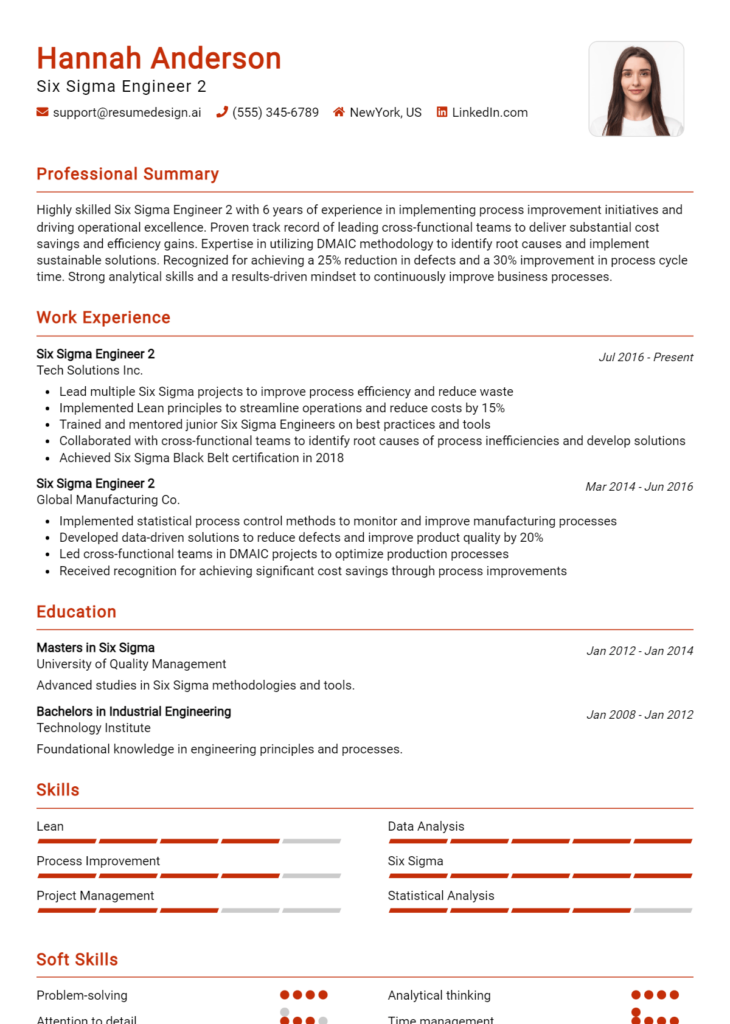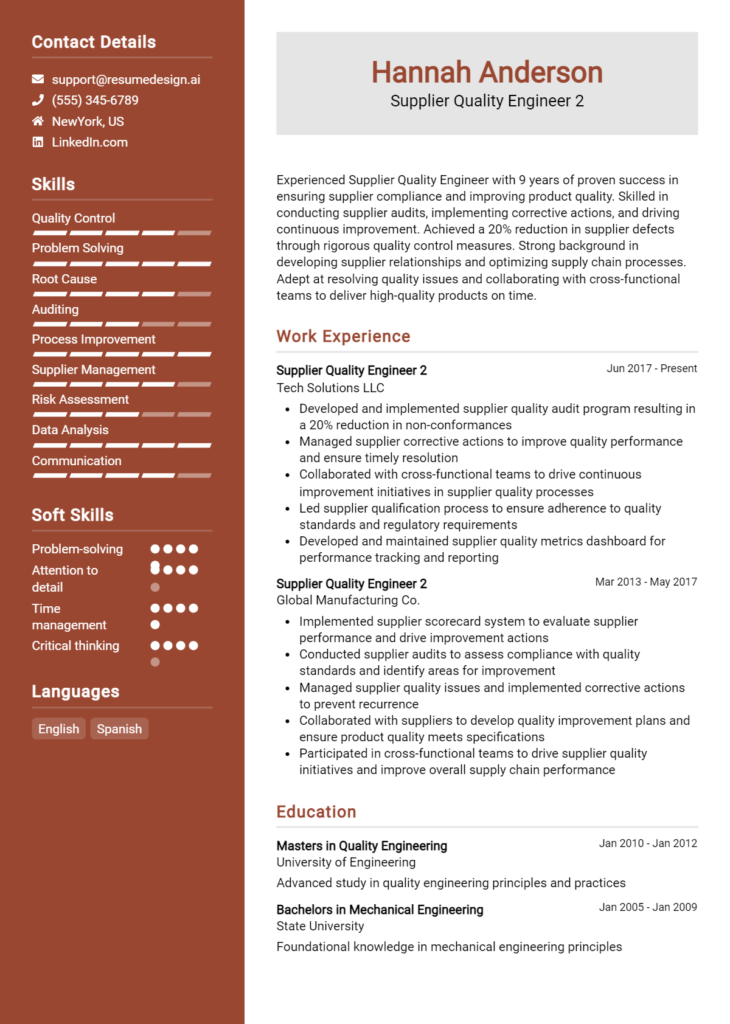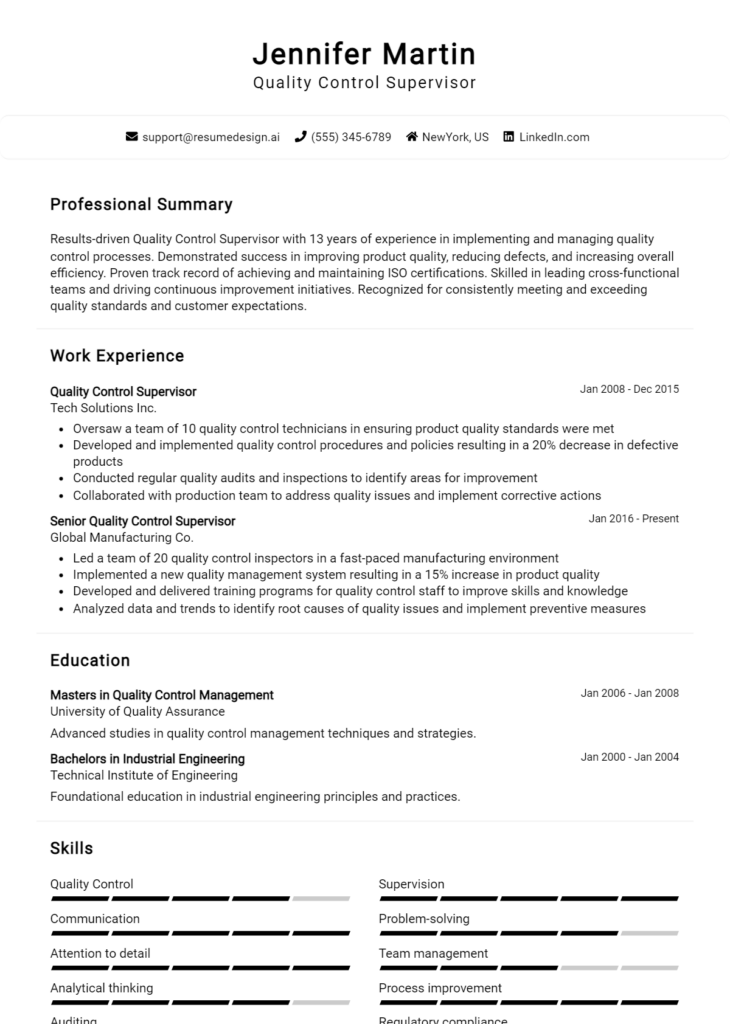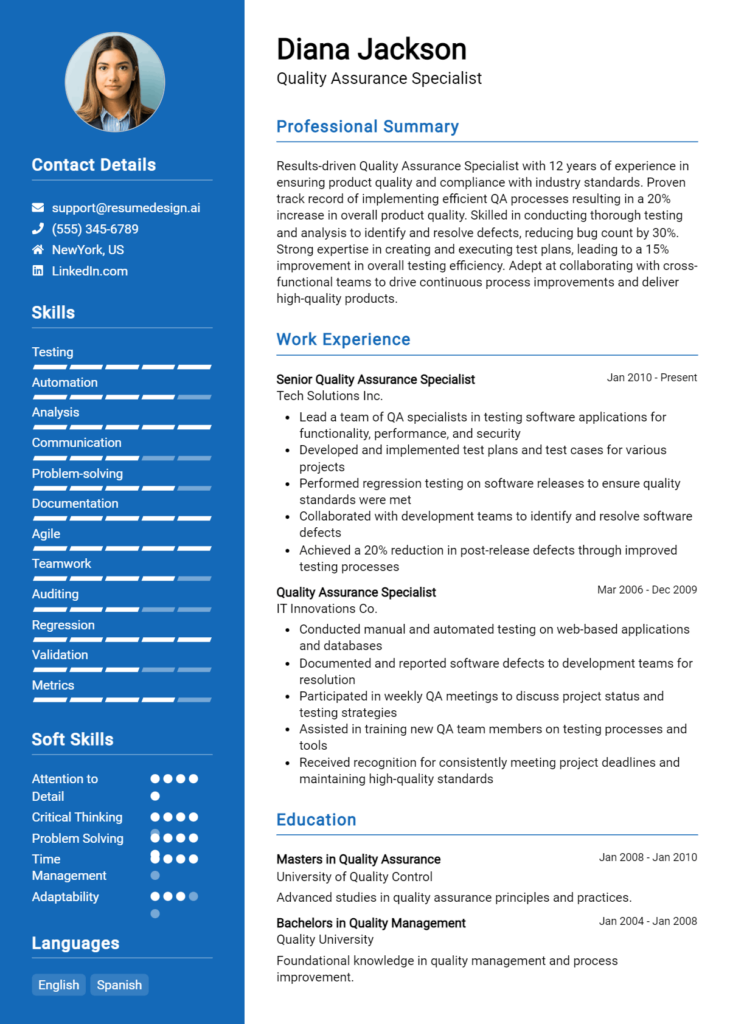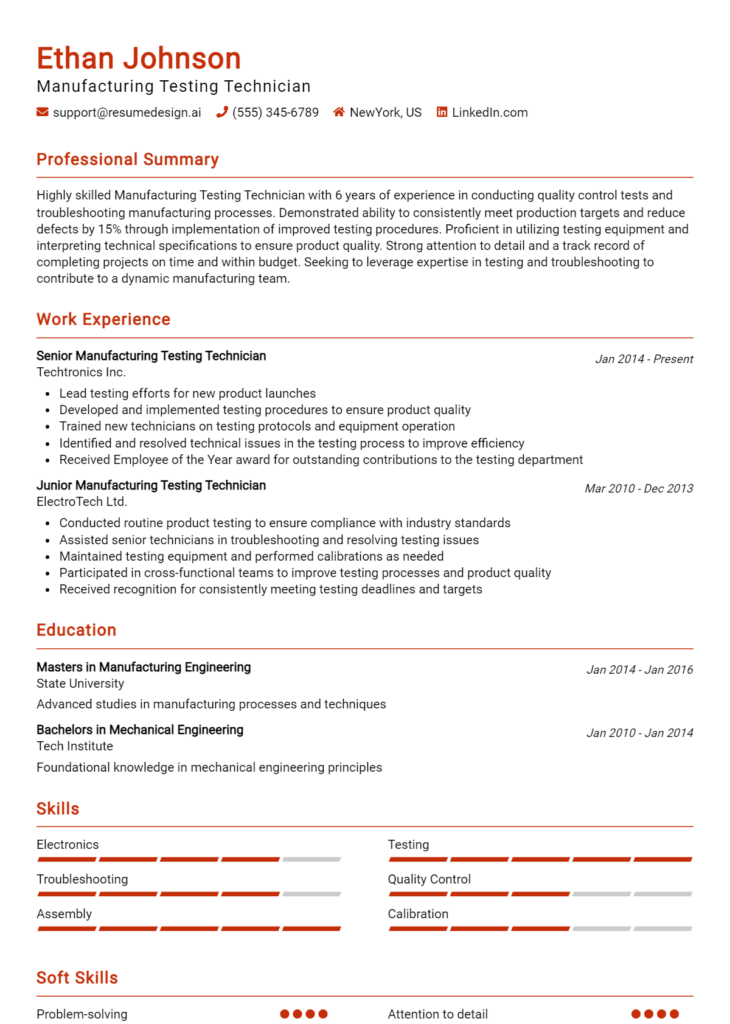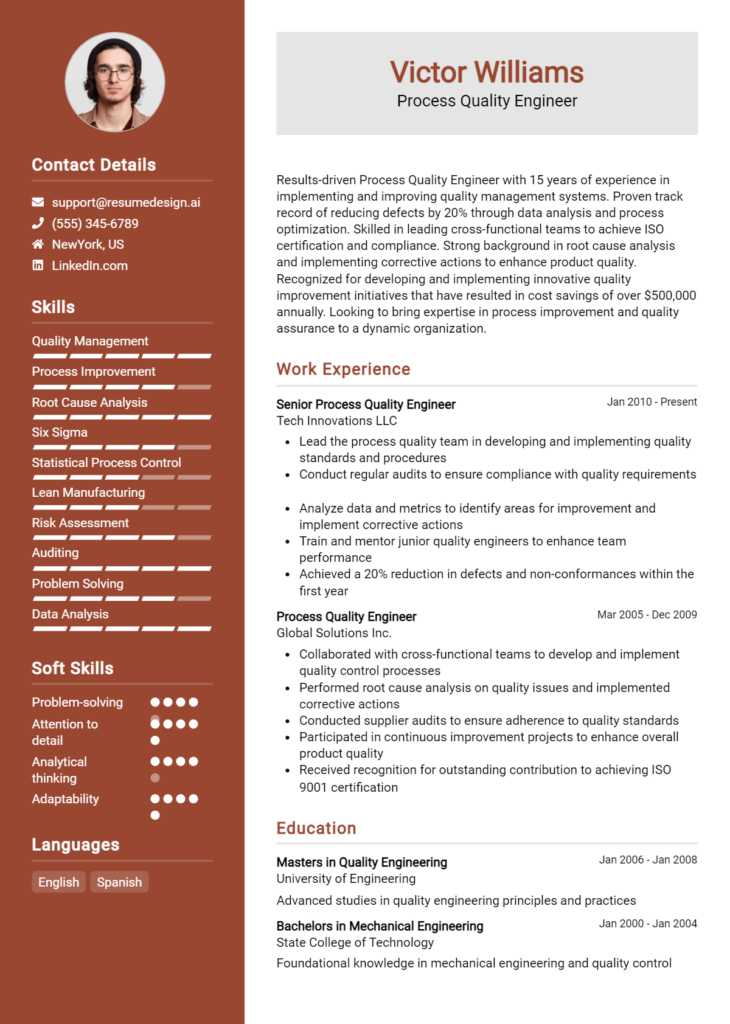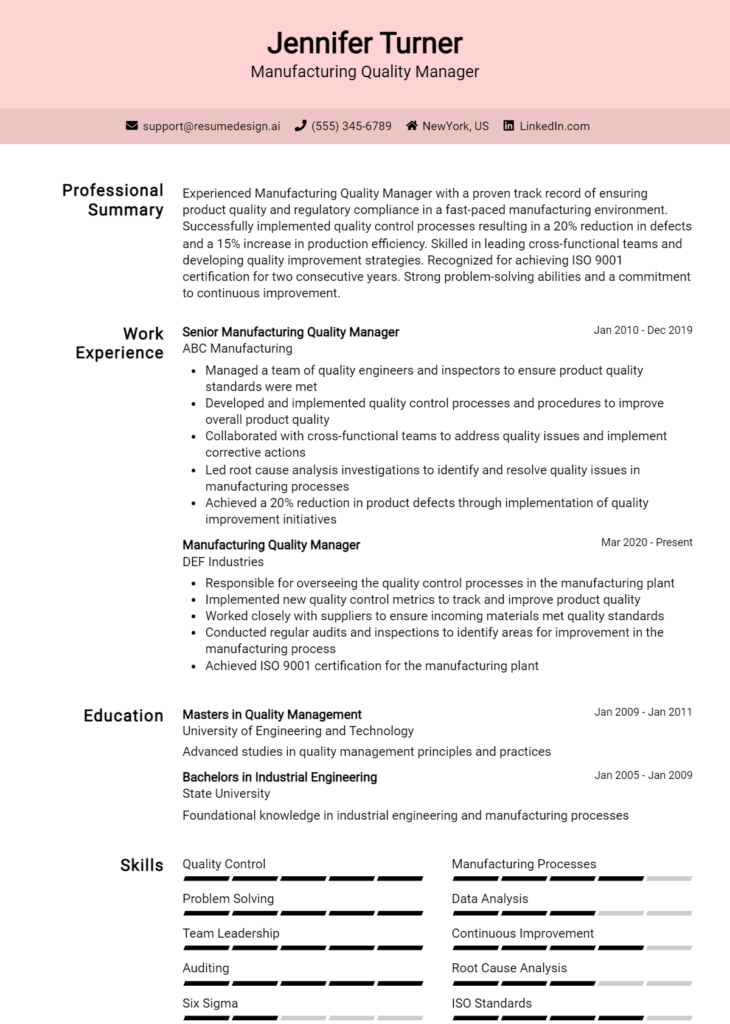womHFyZJBEjOd7MITL3V
Quality Systems Manager Core Responsibilities
A Quality Systems Manager plays a pivotal role in enhancing organizational efficiency by overseeing quality management systems across various departments. Key responsibilities include developing and implementing quality policies, conducting audits, and ensuring compliance with regulatory standards. Essential skills encompass technical expertise, operational insight, and advanced problem-solving abilities, enabling the manager to effectively bridge gaps between teams. A well-structured resume highlighting these qualifications is crucial for showcasing the candidate's potential to meet the organization’s goals.
Common Responsibilities Listed on Quality Systems Manager Resume
- Develop and implement quality management systems and procedures
- Conduct regular quality audits and assessments
- Ensure compliance with industry regulations and standards
- Coordinate training programs on quality standards for staff
- Analyze quality data to identify trends and areas for improvement
- Collaborate with cross-functional teams to enhance quality processes
- Manage non-conformance reports and corrective action plans
- Facilitate continuous improvement initiatives
- Prepare documentation and reports for management review
- Act as a liaison between departments to ensure quality alignment
- Lead root cause analysis for quality issues
High-Level Resume Tips for Quality Systems Manager Professionals
In today's competitive job market, a well-crafted resume is essential for Quality Systems Manager professionals looking to make a strong first impression on potential employers. Your resume is often the first point of contact that you have with hiring managers, and it needs to effectively showcase not only your skills but also your achievements in the field. A compelling resume will highlight your expertise in quality management systems, regulatory compliance, and continuous improvement, setting you apart from other candidates. This guide provides practical and actionable resume tips specifically tailored for Quality Systems Manager professionals to help you present your qualifications in the best light.
Top Resume Tips for Quality Systems Manager Professionals
- Tailor your resume for each job application by closely aligning your skills and experience with the job description.
- Highlight relevant experience in quality systems, including your roles in implementing and managing ISO standards or other quality frameworks.
- Quantify your achievements with specific metrics, such as improvements in product quality, reductions in defects, or cost savings realized through quality initiatives.
- Include industry-specific skills and certifications, such as Six Sigma, Lean Management, or ASQ certifications, to demonstrate your expertise.
- Use action verbs to describe your responsibilities and accomplishments, making your contributions clear and impactful.
- Incorporate keywords from the job description to improve your chances of passing Applicant Tracking Systems (ATS).
- Organize your resume with clear headings and bullet points for easy readability, ensuring that critical information stands out.
- Showcase your leadership and team collaboration skills, particularly in cross-functional projects related to quality improvement.
- Include a summary statement at the top that encapsulates your qualifications and sets the tone for the rest of the resume.
By implementing these tips, you can significantly increase your chances of landing a job in the Quality Systems Manager field. A tailored, achievement-focused resume will not only highlight your qualifications but also demonstrate your commitment to excellence in quality management, making you a standout candidate in the eyes of potential employers.
Why Resume Headlines & Titles are Important for Quality Systems Manager
In today's competitive job market, a well-crafted resume headline or title is crucial for a Quality Systems Manager. This brief yet impactful phrase serves as the first impression a hiring manager has of a candidate, encapsulating their key qualifications and unique value proposition. A strong headline can immediately grab attention and differentiate a candidate from the sea of applicants. It should be concise, relevant, and directly tied to the position being applied for, ensuring that it highlights the candidate’s strengths and suitability for the role in a compelling way.
Best Practices for Crafting Resume Headlines for Quality Systems Manager
- Keep it concise: Aim for a headline that is no longer than 10-12 words.
- Be role-specific: Tailor the headline to reflect the Quality Systems Manager position.
- Highlight key skills: Include important qualifications or skills that are relevant to quality management.
- Use action verbs: Start with strong action verbs to convey a sense of proactivity.
- Avoid jargon: Use clear language that can be easily understood by hiring managers.
- Showcase achievements: If applicable, include notable accomplishments that set you apart.
- Make it compelling: Use adjectives that evoke a sense of professionalism and expertise.
- Align with job description: Ensure your headline resonates with the specific qualifications outlined in the job posting.
Example Resume Headlines for Quality Systems Manager
Strong Resume Headlines
Results-Driven Quality Systems Manager with 10+ Years in GMP Compliance
Detail-Oriented Quality Systems Expert Specializing in ISO 9001 Implementation
Innovative Quality Assurance Leader Focused on Continuous Improvement and Risk Management
Certified Quality Systems Manager Committed to Enhancing Operational Efficiency
Weak Resume Headlines
Quality Manager
Experienced Professional Seeking Opportunities
Skilled in Quality Systems
The strong headlines are effective because they are specific, action-oriented, and directly related to the role of a Quality Systems Manager. They convey not only the candidate’s experience but also their commitment to excellence and continuous improvement. In contrast, the weak headlines fail to impress due to their vagueness and lack of detail. They do not provide any insight into the candidate's qualifications or unique strengths, making it difficult for hiring managers to see the value they could bring to the organization.
Writing an Exceptional Quality Systems Manager Resume Summary
A resume summary is a critical component for a Quality Systems Manager as it serves as the first impression to hiring managers. A well-crafted summary quickly captures attention by highlighting essential skills, relevant experience, and notable accomplishments that align with the job requirements. It should be concise yet impactful, allowing the candidate to stand out in a competitive job market. Tailoring the summary to the specific role enhances its effectiveness, demonstrating a direct connection between the candidate's qualifications and the employer's needs.
Best Practices for Writing a Quality Systems Manager Resume Summary
- Quantify Achievements: Include specific metrics to showcase the impact of your work, such as percentage improvements or cost savings.
- Focus on Skills: Highlight key competencies relevant to quality systems management, such as regulatory compliance, risk management, and process improvement.
- Tailor the Summary: Customize your summary for each job application, reflecting the specific qualifications and skills mentioned in the job description.
- Be Concise: Aim for 2-3 sentences that encapsulate your experience and value proposition without being overly verbose.
- Use Action Verbs: Start sentences with strong action verbs to convey confidence and proactivity.
- Showcase Industry Knowledge: Mention familiarity with industry standards such as ISO, FDA regulations, or Six Sigma methodologies.
- Highlight Leadership Experience: If applicable, emphasize any managerial or team leadership roles that demonstrate your ability to guide quality initiatives.
- Include Relevant Certifications: Mention any relevant certifications like Certified Quality Manager (CQM) or Quality Systems Auditor (CQA) to enhance credibility.
Example Quality Systems Manager Resume Summaries
Strong Resume Summaries
Results-driven Quality Systems Manager with over 10 years of experience in implementing ISO 9001 standards, leading to a 30% reduction in compliance issues and a 20% increase in customer satisfaction ratings. Proven ability to manage cross-functional teams to streamline quality processes and enhance product reliability.
Detail-oriented Quality Systems Manager with a track record of developing and executing quality assurance programs that reduced operational costs by 15% while improving process efficiency by 25%. Expertise in regulatory compliance and risk assessment within the pharmaceutical industry.
Dedicated Quality Systems Manager with extensive experience in Six Sigma methodologies, successfully leading projects that improved manufacturing accuracy by 35% and decreased defect rates by 40%. Strong leadership skills with a focus on fostering a culture of continuous improvement.
Weak Resume Summaries
Quality Systems Manager with experience in quality assurance and management. Looking for a position to utilize my skills.
Experienced professional in quality systems. I have worked in various industries and am interested in furthering my career.
The examples of strong resume summaries are effective because they provide specific, quantified achievements that demonstrate the candidate's impact in previous roles. They also include relevant skills and industry knowledge tailored to the Quality Systems Manager position. In contrast, the weak summaries lack detail, are overly generic, and do not convey any measurable outcomes or specific competencies, making them less compelling to hiring managers.
Work Experience Section for Quality Systems Manager Resume
The work experience section of a Quality Systems Manager resume is crucial in demonstrating the candidate's technical skills, leadership abilities, and commitment to delivering high-quality products. This section provides a platform for showcasing achievements that align with industry standards, emphasizing the candidate's capacity to manage teams effectively and implement quality systems that enhance operational efficiency. By quantifying accomplishments, candidates can illustrate their impact on previous organizations, making their resumes stand out to potential employers.
Best Practices for Quality Systems Manager Work Experience
- Highlight technical expertise in quality management systems (QMS) and regulatory compliance.
- Use metrics to quantify results, such as percentage improvements in product quality or reductions in defect rates.
- Detail leadership roles, emphasizing team management and cross-departmental collaboration.
- Showcase successful project implementations that align with industry standards and best practices.
- Include specific methodologies used, such as Six Sigma or ISO standards.
- Demonstrate continuous improvement initiatives and their measurable outcomes.
- Tailor experiences to match the job description, focusing on relevant skills and achievements.
- Utilize action verbs to convey proactivity and impact in previous roles.
Example Work Experiences for Quality Systems Manager
Strong Experiences
- Led a cross-functional team to implement a new QMS, resulting in a 25% reduction in product non-conformities over two years.
- Developed and executed training programs for quality assurance staff that improved inspection accuracy by 30%, enhancing overall product quality.
- Successfully managed a quality improvement project that decreased customer complaints by 40% through root cause analysis and corrective action plans.
- Streamlined the internal audit process, achieving compliance with ISO 9001 standards and reducing audit time by 15%.
Weak Experiences
- Worked on quality-related tasks with little detail on specific contributions or outcomes.
- Assisted in developing quality processes without explaining the impact or results of those processes.
- Participated in team meetings to discuss quality issues but did not provide information on leadership or initiatives.
- Helped with audits but did not define the role played or the improvements made as a result.
The examples of strong experiences are considered effective because they provide specific, quantifiable outcomes that demonstrate the candidate's impact and technical leadership in quality management. Conversely, the weak experiences lack detail and measurable results, making it difficult for potential employers to gauge the candidate's contributions or effectiveness in previous roles. By focusing on specific achievements and the outcomes of their efforts, candidates can create a compelling narrative that highlights their qualifications for the Quality Systems Manager position.
Education and Certifications Section for Quality Systems Manager Resume
The education and certifications section of a Quality Systems Manager resume is crucial for establishing the candidate's foundational knowledge and expertise in quality management principles and practices. This section not only showcases the academic background but also highlights industry-relevant certifications and continuous learning efforts that are vital in today’s evolving quality landscape. By providing relevant coursework, certifications, and specialized training, candidates can significantly enhance their credibility and demonstrate their commitment to maintaining high standards in quality management, thereby aligning themselves with the expectations of potential employers.
Best Practices for Quality Systems Manager Education and Certifications
- Focus on relevant degrees such as a Bachelor's or Master's in Quality Management, Engineering, or related fields.
- List industry-recognized certifications like ASQ Certified Quality Manager (CQM) or Six Sigma Green/Black Belt.
- Include relevant coursework that directly pertains to quality systems and methodologies.
- Highlight any specialized training programs or workshops attended that enhance quality management skills.
- Provide details on continuing education efforts, such as online courses or seminars.
- Organize the section clearly, separating degrees from certifications for easy readability.
- Use specific dates to indicate when degrees were earned and certifications were obtained or renewed.
- Emphasize any leadership or advanced training that showcases management capabilities in quality systems.
Example Education and Certifications for Quality Systems Manager
Strong Examples
- Bachelor of Science in Quality Assurance, University of Excellence, 2015
- Certified Quality Manager (CQM) from the American Society for Quality, 2021
- Six Sigma Black Belt certification, Quality Institute, 2020
- Completed coursework in Statistical Process Control and Lean Manufacturing.
Weak Examples
- Bachelor of Arts in History, University of Heritage, 2010
- Certification in Basic Computer Skills, Online Academy, 2019
- Completed a workshop on Non-Profit Management, 2021
- Diploma in Culinary Arts, Culinary School of America, 2018
The examples provided are considered strong because they directly relate to the qualifications and skills necessary for a Quality Systems Manager role. The academic background in quality assurance and relevant certifications demonstrate a commitment to the quality field and proficiency in essential methodologies. In contrast, the weak examples reflect a lack of relevance to quality management and do not support the candidate's fit for the position, as they pertain to unrelated fields and outdated skills.
Top Skills & Keywords for Quality Systems Manager Resume
As a Quality Systems Manager, possessing a robust set of skills is paramount to effectively overseeing quality assurance processes and ensuring compliance with industry standards. A well-crafted resume not only highlights your professional achievements but also showcases the essential skills that align with the demands of the role. Employers look for candidates who can navigate complex regulatory environments while maintaining high-quality standards. Thus, incorporating relevant skills into your resume is crucial for standing out in a competitive job market. For those interested in optimizing their resumes, understanding the significance of both hard and soft skills is essential for demonstrating a well-rounded professional profile.
Top Hard & Soft Skills for Quality Systems Manager
Soft Skills
- Leadership and Team Management
- Communication and Interpersonal Skills
- Problem-Solving and Critical Thinking
- Attention to Detail
- Adaptability and Flexibility
- Conflict Resolution
- Time Management
- Collaboration and Teamwork
- Analytical Thinking
- Decision-Making
Hard Skills
- Quality Management Systems (QMS) Knowledge
- ISO 9001 Certification
- Regulatory Compliance Understanding
- Statistical Process Control (SPC)
- Root Cause Analysis (RCA)
- Auditing and Inspection Skills
- Risk Management
- Data Analysis and Reporting
- Six Sigma Methodologies
- Quality Improvement Techniques
By focusing on these key skills, candidates can tailor their resumes to reflect the competencies that are most relevant to the Quality Systems Manager position. Additionally, showcasing relevant work experience in conjunction with these skills can further reinforce your qualifications and suitability for the role.
Stand Out with a Winning Quality Systems Manager Cover Letter
I am writing to express my interest in the Quality Systems Manager position at [Company Name], as advertised on [Job Board/Company Website]. With over [X years] of experience in quality management systems, I have successfully developed, implemented, and maintained quality assurance processes that not only meet regulatory requirements but also enhance operational efficiency and customer satisfaction. My background in [specific industry or field] has equipped me with a comprehensive understanding of quality standards, including ISO 9001 and Six Sigma methodologies, which I am eager to leverage to drive excellence at [Company Name].
In my previous role at [Previous Company Name], I led a cross-functional team in the overhaul of our quality assurance framework, resulting in a [specific achievement, e.g., a 20% reduction in defects or a successful ISO audit]. I am adept at conducting internal audits, root cause analysis, and developing corrective action plans that address quality issues proactively. My commitment to fostering a culture of continuous improvement has enabled my teams to not only comply with industry standards but also exceed customer expectations consistently. I am particularly drawn to [Company Name] because of its reputation for innovation and quality, and I am excited about the opportunity to contribute to your mission.
I possess strong analytical and problem-solving skills, which I believe are crucial for a Quality Systems Manager. My ability to communicate effectively with all levels of an organization allows me to build collaborative relationships that drive quality initiatives forward. Additionally, my experience in training and mentoring staff on quality best practices has proven invaluable in creating a workforce that is both knowledgeable and engaged in maintaining high standards. I am passionate about quality management and committed to ensuring that [Company Name] not only meets but exceeds its quality goals.
Thank you for considering my application. I am looking forward to the opportunity to discuss how my skills and experiences align with the needs of your team. I am eager to bring my expertise in quality management systems to [Company Name] and contribute to the continued success of your operations. Please feel free to contact me at [Your Phone Number] or [Your Email] to schedule a discussion.
Common Mistakes to Avoid in a Quality Systems Manager Resume
When crafting a resume for the role of a Quality Systems Manager, it's crucial to present your qualifications and experience effectively. However, many candidates make common mistakes that can hinder their chances of landing an interview. By avoiding these pitfalls, you can enhance the clarity and impact of your resume, showcasing your suitability for this critical position. Here are some common mistakes to keep in mind:
Lack of Specificity: Failing to include specific metrics or examples of past achievements can leave hiring managers questioning the extent of your impact. Use quantifiable results to illustrate your contributions.
Overly Technical Language: While industry jargon can demonstrate expertise, excessive technical terms may alienate non-specialist reviewers. Aim for a balance that showcases your knowledge without overwhelming the reader.
Ignoring Keywords: Many companies use Applicant Tracking Systems (ATS) to filter resumes. Neglecting to incorporate relevant keywords from the job description can result in your resume being overlooked.
Unorganized Format: A cluttered or inconsistent layout can make your resume difficult to read. Ensure a clean, organized structure with clear headings and bullet points for easy navigation.
Vague Job Descriptions: Providing generic descriptions of past roles can fail to highlight your specific contributions. Tailor your descriptions to reflect the unique responsibilities and achievements relevant to quality systems management.
Omitting Soft Skills: While technical expertise is essential, soft skills like leadership, communication, and problem-solving are equally important in a managerial role. Highlight these attributes to demonstrate your well-rounded capabilities.
Not Tailoring the Resume: Using a one-size-fits-all resume for every application can be detrimental. Customize your resume to fit the specific requirements and culture of each company you apply to.
Neglecting Education and Certifications: Failing to prominently display relevant qualifications, certifications, or ongoing education can make it seem like you're not committed to your professional development. Ensure these credentials are easily identifiable on your resume.
Conclusion
In summary, the role of a Quality Systems Manager is pivotal in ensuring that an organization's quality systems are not only compliant with regulatory requirements but also effectively contribute to the overall efficiency and success of the business. Key responsibilities include overseeing quality assurance processes, implementing industry standards, and driving continuous improvement initiatives. A Quality Systems Manager must possess a strong understanding of quality management systems, analytical skills, and the ability to lead cross-functional teams.
As you reflect on the insights shared, consider the importance of having a polished and professional resume that accurately represents your qualifications and experience in this critical role. Take the time to review your Quality Systems Manager resume and ensure it aligns with the expectations of hiring managers in the industry.
To assist you in this process, we invite you to explore valuable resources such as resume templates, which can provide a solid foundation for your document. If you prefer a more hands-on approach, try out our resume builder to create a customized resume tailored to your skills and experiences. Additionally, browsing through resume examples can inspire you to highlight your achievements effectively. Don't forget to complement your resume with a compelling application by utilizing our cover letter templates.
Take action today and elevate your resume to stand out in the competitive job market!

